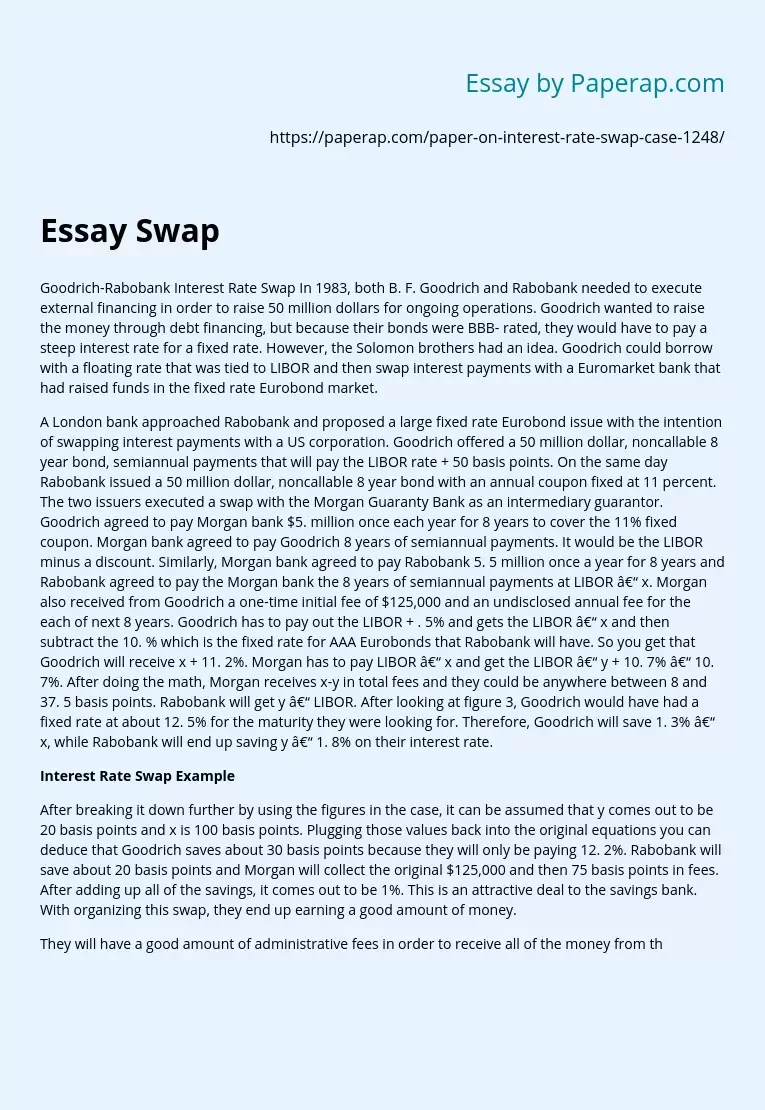Goodrich-Rabobank
The following sample essay on Goodrich-Rabobank Interest Rate Swap In 1983, both B. F. Goodrich and Rabobank needed to execute external financing in order to raise 50 million dollars for ongoing operations. Goodrich wanted to raise the money through debt financing, but because their bonds were BBB- rated, they would have to pay a steep interest rate for a fixed rate. However, the Solomon brothers had an idea. Goodrich could borrow with a floating rate that was tied to LIBOR and then swap interest payments with a Euromarket bank that had raised funds in the fixed rate Eurobond market.
A London bank approached Rabobank and proposed a large fixed rate Eurobond issue with the intention of swapping interest payments with a US corporation. Goodrich offered a 50 million dollar, noncallable 8 year bond, semiannual payments that will pay the LIBOR rate + 50 basis points. On the same day Rabobank issued a 50 million dollar, noncallable 8 year bond with an annual coupon fixed at 11 percent. The two issuers executed a swap with the Morgan Guaranty Bank as an intermediary guarantor.
Goodrich agreed to pay Morgan bank $5. million once each year for 8 years to cover the 11% fixed coupon. Morgan bank agreed to pay Goodrich 8 years of semiannual payments. It would be the LIBOR minus a discount. Similarly, Morgan bank agreed to pay Rabobank 5. 5 million once a year for 8 years and Rabobank agreed to pay the Morgan bank the 8 years of semiannual payments at LIBOR – x. Morgan also received from Goodrich a one-time initial fee of $125,000 and an undisclosed annual fee for the each of next 8 years.
Goodrich has to pay out the LIBOR + . 5% and gets the LIBOR – x and then subtract the 10. % which is the fixed rate for Eurobonds that Rabobank will have. So you get that Goodrich will receive x + 11. 2%. Morgan has to pay LIBOR – x and get the LIBOR – y + 10. 7% – 10. 7%. After doing the math, Morgan receives x-y in total fees and they could be anywhere between 8 and 37. 5 basis points. Rabobank will get y – LIBOR. After looking at figure 3, Goodrich would have had a fixed rate at about 12. 5% for the maturity they were looking for. Therefore, Goodrich will save 1. 3% – x, while Rabobank will end up saving y – 1. 8% on their interest rate.
Interest Rate Swap Example
After breaking it down further by using the figures in the case, it can be assumed that y comes out to be 20 basis points and x is 100 basis points. Plugging those values back into the original equations you can deduce that Goodrich saves about 30 basis points because they will only be paying 12. 2%. Rabobank will save about 20 basis points and Morgan will collect the original $125,000 and then 75 basis points in fees. After adding up all of the savings, it comes out to be 1%. This is an attractive deal to the savings bank. With organizing this swap, they end up earning a good amount of money. They will have a good amount of administrative fees in order to receive all of the money from the swap and then proceed to pay out the right amount each period and keep up with the LIBOR rates to adjust the floating rate note. However, with collecting the original $125,000 and then gaining the 75 basis points in fees, they will be able to cover all of their expenses in the swap and make this a profitable investment. For the Goodrich and Rabobank this is a win-win situation for them. Because of entering the swap and analyzing the numbers from the case, both of them will end up saving money. The rates they would have had if they sold their notes without swapping would have been higher than what they end up having to pay now. Even with having to pay fees to Morgan, saving 20 to 30 basis points is a big deal. The only people that this could be a loss for are the investors that are buying the notes. They could be viewed as not as well off because they are not getting as good of a rate on the notes that they bought. However, both of the investments are still very good and pay close to the standard amount.
Goodrich-Rabobank. (2019, Dec 05). Retrieved from https://paperap.com/paper-on-interest-rate-swap-case-1248/

